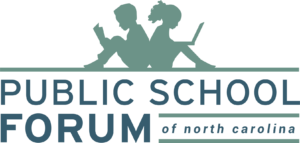
(Raleigh, NC) March 15, 2023 — Governor Cooper’s 2023-25 biennium budget proposes significant and much-needed investments in public education to meet the needs of children and communities across the state – without increasing taxes. The budget addresses many of the evidence-based action items called for in the Public School Forum’s 2023-24 Top Education Issues. NC has a tremendous opportunity to invest in our communities, families, and students due in part to an estimated $3 billion budget surplus. North Carolina is currently last among all states in public school funding effort when adjusted for regional cost differences, and now is the time to invest in what will help our economy and businesses continue to thrive – our education system.
In North Carolina, approximately one-third of educators earn less than the minimum livable wage for a family of four, and teachers earn approximately 24.5 percent less than similarly-educated peers in other fields. Governor Cooper has proposed major pay increases for educators that would be a game-changer for both current and prospective educators,– and the timing could not be more critical as we face massive educator shortages. With the Governor’s proposed budget, educators would see an average pay increase of 18% over the biennium, with 10% increases in the first year and 6% increases in the second year for both teachers and principals, as well as retention bonuses and reinstatement of master’s pay for teachers with a relevant degree. The budget would lift North Carolina from 46th to 16th in the country in beginning teacher pay, and take us from where we are now – falling 17% below Alabama in beginning teacher pay – to second in the Southeast.
Parents and caregivers share that mental health and school safety are top concerns when it comes to their children. We hear this from rural, urban, and suburban districts across NC. The Governor’s budget invests in the people who support the well-being of our students, including social workers, nurses, counselors, and psychologists. It also invests in school safety grants to support local schools and districts to do what they need to ensure their students are safe.
Our state is in the position to make targeted, research-based investments in education without raising taxes, ensuring that we are able to grow the workforce we need for thriving communities and businesses. We must take advantage of this tremendous opportunity to invest in what North Carolina communities value most: our students, our educators, and our future. Budgets are a reflection of our values, and below you will find specific items from the Governor’s budget that reflect the values of taxpayers and put the children of NC first by ensuring access to a high-quality and equitable education.
Research-Based, Strategic Investments in Education
Teacher Pay, Recruitment, Retention, and Diversity
Our students and families understand the importance of teachers, and research shows that teachers are the number one school related factor that influences student outcomes. We currently have more than 5,000 teacher vacancies across the state, we have seen dramatic declines in enrollment in teacher preparation programs. The Governor’s budget paves the way for us to provide access to a diverse, high-quality teacher workforce across NC and recommends:
- Increasing pay for teachers and school-based administrators by an average of 18% over the biennium. Educators would receive a 10% raise in year one, 6% in year two, plus retention bonuses. Minimum salaries would increase from $37,000 to $46,000.
- Restoration of master’s pay for those with degrees in the subjects they teach.
- Additional funding for advanced teaching roles, recruitment and retention bonuses in high-need and low-wealth counties, matching grant program for teacher residencies in high-needs districts, funding to implement a program to increase National Board Certification among teachers of color and rural teachers and funding to cover costs of National Board Certification for up to 1,000 teachers.
- Increasing funding for the NC Teaching fellows program, expanding eligibility for the program to all approved educator preparation programs and all licensure areas, and increasing programmatic support.
- Increasing funding for grow-your-own and 2+2 teacher recruitment programs across the state.
- Increasing funding for professional development for educators.
Student Mental Health and School Safety
Parents indicate that their top two concerns are mental health and school safety. In NC, the number of youth suicides has doubled in recent years; and since the COVID pandemic began, there has been a 46% increase in youth with one or more major depressive episodes. NC’s ratios of Specialized Instructional Support Personnel (counselors, nurses, psychologists, and social workers) to students are far higher than recommended. The Governor’s budget addresses this in the following ways:
- Providing additional funding for hiring of Specialized Instructional Support Personnel, including school counselors, nurses, social workers, and psychologists.
- Reinstating master’s pay for school social workers.
- Funding 115 school psychologist internship positions for students in school psychology preparation programs to conduct their third-year internships in schools, paid at the level of the starting teacher salary.
- Increasing funding for school safety grants to support school safety training, equipment, and students in crisis.
- Providing funds to reduce school meal debt and increase access to free meals for qualifying students.
Implementing the Leandro Comprehensive Remedial Plan
The Comprehensive Remedial Plan provides a baseline roadmap of the foundational investments needed to meet the minimal constitutional requirement of providing a sound basic education to every child. The Governor’s budget proposal would fully fund years 2,3,4, and 5 of the Comprehensive Remedial Plan and more- to take us above and beyond sound and basic.

Leave a Reply